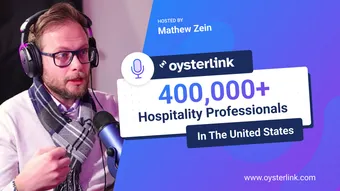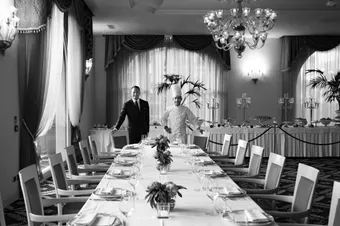You have seen it in the movies, read it in the books – but can your family really influence and shape your career choices? The answer is yes.
In today’s interview, we sat down with Chef Oliva Cox who runs a successful restaurant in Fullerton. She shared her journey, insights and what it really takes to build a successful culinary career.
What inspired you to join the culinary world?
Chef Olivia: Honestly, I’ve always had a passion for food, which started with my large family. Every night felt like an event when it came to making dinner.
I grew up with three siblings and five cousins, plus my mom, dad, aunt and uncle — most nights, we’d all gather under one roof for dinner. When the adults went out, the kids would take over the kitchen.
I remember making breakfast with my cousins, all of us pitching in, and it became something we truly enjoyed together. We didn’t always have a lot, but cooking was a big part of our lives. It brought us together in a way that felt special.
In high school, I kind of forgot about that passion. But as I was nearing graduation, I realized traditional college wasn’t for me — I never enjoyed school. Then I started seeing commercials for culinary school and thought, “Maybe this is it.” It sounded like something I’d genuinely love and, honestly, a way to make sure I’d never go hungry.
Is culinary school worth it?
Chef Olivia: Personally, I think hands-on experience is far more important. I didn’t graduate from culinary school because I had to prioritize working over classes — I was juggling three jobs at the time.
Unfortunately, the school I attended lost its credibility after I left. They had promised students guaranteed chef positions after graduation, which just isn’t realistic, and now they’re dealing with lawsuits.
When people ask me about culinary school, I usually say this: If you can afford the debt and really want the experience, it can be worthwhile. For me, it was a completely new territory, and I’m grateful for what I learned. But honestly, the debt wasn’t worth it, and I’ve learned so much more working in actual kitchens.
The best thing about culinary school was meeting so many people—teachers, classmates and industry professionals with different perspectives and techniques. That exposure was invaluable, but if I had to do it all over again, I wouldn’t go back.
What is a realistic career path in the kitchen?
Chef Olivia: It really depends on the type of kitchen you’re in. For example, I currently work in a smaller, family-owned restaurant, but before this, I worked at Disney, in what used to be Ariel’s Grotto (now Lamplight Lounge).
In a corporate setting like Disney, there are more hoops to jump through — seniority, limited openings and rigid systems. I started as a prep cook and had to work there for about four months before getting the chance to cross-train as a line cook.
Progress can feel slow because it’s not always about your skill; it’s often about timing and company policies.
In smaller kitchens, like the one I’ve been in for almost eight years, progress is based more on performance. I started on sauté and moved up by mastering each station. Promotions here are about your skill and drive, not just logistics or seniority. But even in these environments, it takes time.
For instance, I went from line cook to lead line cook pretty quickly, but it took another two and a half years to become a chef. I even had to watch someone else be brought in as sous chef before me, despite already doing much of the work, simply because I hadn’t been there long enough.
A lot of people think hard work will lead to overnight success, but that’s not realistic.
I’ve been in this industry for nearly a decade, and I’m only now in the position I’ve worked for. It’s a long journey, but if you’re dedicated, it doesn’t feel that way — it’s worth it in the end.
How to achieve work-life balance in a culinary career?
Chef Olivia: Achieving work-life balance in this industry starts with communication and planning. In my restaurant, we don’t base time-off requests on seniority. It’s about planning ahead, communicating with the team and being clear about your needs.
For a long time, I didn’t prioritize my personal life, especially before COVID. During the pandemic, I realized how much I had neglected myself by always putting work first. That shift taught me the importance of prioritizing downtime.
My advice is to find small ways to reset — you don’t need a 10-day vacation. Whether it’s a hobby or a short break, be honest with yourself when you need it. Burnout is common in this industry, and many people push themselves past the breaking point. When you feel unmotivated, sick, or uninspired, it’s a sign you need to step back.
Be honest with your team and your employer. In my kitchen, I’ve worked hard to remove the stigma around asking for a break. It’s not shameful or weak to admit you’re tired or need extra time off. You can’t give 100% to your job if you’re not taking care of yourself.
Knowing your limits and respecting them is key. Taking time for yourself isn’t a sign of failure — it’s what allows you to show up stronger.
What are the top skills young cooks should develop to set themselves up for success?
Chef Olivia: The two most important skills for young cooks are basic knife skills and time management.
Knife skills are essential. You should master cuts like julienne, brunoise, small and medium dice, and know when precision matters versus when it doesn’t — like rough chopping for a sauce. Everything in the kitchen is done with intention, so understanding why you’re making a specific cut is just as important as executing it well.
Time management is critical. Every second counts, and it’s vital to avoid falling behind. Many people think time management means doing tasks one after another, but in the kitchen, you often need to juggle multiple tasks simultaneously while staying attentive to everything.
I once had a cook who timed herself during prep to improve her speed without competing with others. It was inspiring to see someone take personal initiative to grow. That mindset — working efficiently and challenging yourself to improve — is invaluable.
Ultimately, these skills help ensure a smooth service and set you up for long-term success in the culinary world.
What are leadership qualities needed to succeed in a kitchen?
Chef Olivia: Strong communication and humility are two essential leadership qualities for success in a kitchen.
When it comes to communication, it’s not just about giving orders or outlining daily tasks. It’s also about showing appreciation for your team — acknowledging their efforts with a simple, “Thank you for doing a great job today.”
For constructive feedback, it’s important to approach situations thoughtfully, asking why something was done a certain way and explaining preferred methods without being overly critical. Kitchens break down when communication becomes solely about commanding or criticizing.
Equally important is creating a safe and open environment. Let your team know they can approach you with anything — there’s nothing they could say that you can’t handle. This openness fosters trust and helps the entire team grow.
Another key trait is humility. Never let your ego inflate just because you’re in a position of authority. I’ve seen people let power go to their heads, thinking they’re untouchable or that they know everything. But in this industry, no one knows everything.
One of the best aspects of this field is its constant evolution — there’s always something new to learn, whether it’s a different recipe or a unique approach to a task. Be willing to learn from everyone, even your cooks or chefs who report to you.
Finally, lead by example. Never ask your team to do something you wouldn’t do yourself. Whether it’s creating a dish or taking on a challenging shift, show that you understand their workload and are willing to share it.
Great kitchen leadership is built on communication, humility and a genuine willingness to support and learn from your team.
What is the one thing you wish you knew before you started out?
Chef Olivia: I wish I had known to take better care of myself — both physically and mentally, but especially physically — when I was younger.
Starting out, I took my health for granted. As I progressed in this industry, I often pushed health concerns to the back burner. It wasn’t until this past year that I had health insurance consistently for the first time since childhood. I’ve been actively going to the doctor and working on getting my health back on track.
This isn’t unique to me — I’ve spoken to so many people in this industry who say, “I should go to the doctor,” but they don’t because they can’t afford it, don’t have time, or prioritize work over their health. I wish I had listened to advice about this when I was starting out.
I started working in this industry at 18, and I put my body through long, grueling hours with little to no self-care — no gym, no rest days, no doctor’s visits. I wasn’t paying attention to the toll it was taking on me.
It wasn’t until my current relationship that I had a wake-up call. I noticed my partner wasn’t taking care of himself, and when I called him out on it, he responded, “You don’t do it either.” That really struck a chord.
Looking back, I realize there were so many stressful and overworked days that could have been easier if I had prioritized my well-being. I had bought into the toxic mindset that this industry demands you work yourself into the ground. But that’s simply not true — taking care of yourself is crucial to longevity and success in this field.
And yes, I owe a big thank-you to my partner for inspiring me to make my health a priority. It’s been an uphill journey, but it’s worth it.
How to attract Gen Z to join the industry?
Chef Olivia: I don’t feel like it’s necessarily that young people don’t want to work anymore, but rather they want to work for fair wages and have personal time off as a requirement, not a suggestion. Sick days, for example, should be a right, not something where you're expected to work through illness.
This industry is still very set in its ways — like the mentality of "you only call out if you’re dying" or that personal time off is unheard of. Many chefs expect the younger generation to work the same way they did, but younger workers aren’t willing to do that, and honestly, they’ve got it right. You shouldn’t have to break your body or kill yourself to do your job.
When you create a healthy work environment, where having sick days or personal time off is normalized, you’ll naturally attract younger people to the industry.
It’s also not true that Gen Z doesn’t work hard. In my kitchen, a lot of the staff are in the younger generation, and they’re some of the hardest workers I know. They just also understand the importance of taking care of themselves, and that’s fine.
What’s frustrating is that a lot of the older generation in this industry treat this shift as laziness or weakness. It’s like the attitude of a toxic parent who says, “I struggled, so you should too.”
But why perpetuate that cycle? You should want the next generation to be better off, not just continue being overworked and sacrificing their physical and mental health for a paycheck.
We’ve built something — it’s time to make it better for everyone. That’s how you’ll attract the younger generation: by offering them respect, balance and the tools to thrive in their careers without sacrificing their health and happiness.
Is it time to start your culinary career with the right opportunities?
As Chef Olivia’s story demonstrates, a successful culinary career is built on passion, perseverance and a willingness to learn from every experience. The road may not always be easy, but for those who are committed, it’s a journey worth taking.
Whether you're starting as a Prep Cook or aiming for a Chef position; the right job can help you grow in a supportive and rewarding environment.







Loading comments...